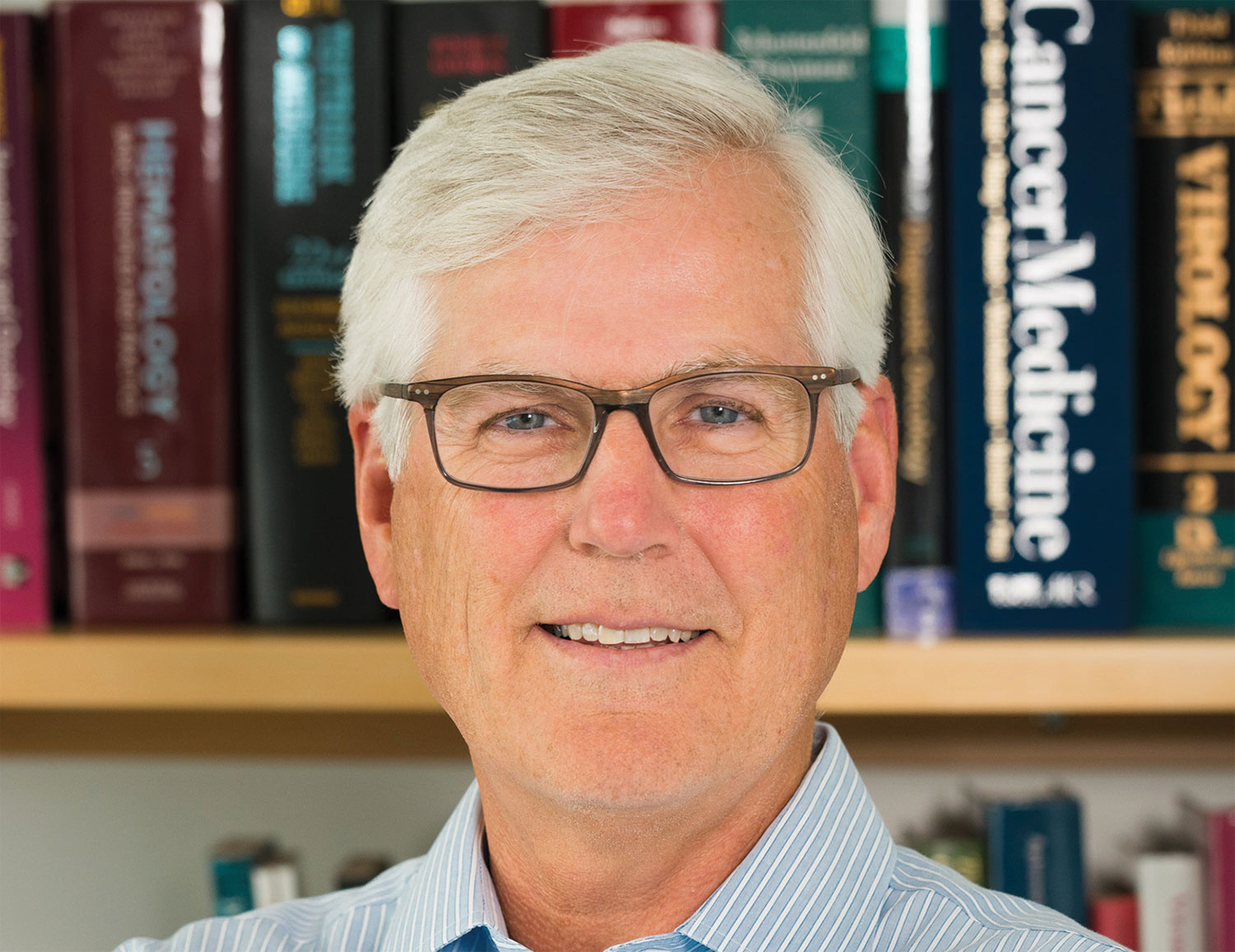CAPTIVATING HEADLINES CONTINUE TO PROMISE a new frontier in treating cancer where immunotherapy harnesses the patient’s own immune system and precision medicine takes aim at the molecular machinery of cancer cells. In some news stories, accounts of patients’ cancer disappearing, documented by a series of pictures or scans, provide proof of once-inconceivable remissions.
The typical patient’s perspective is much less inspiring—centering more often on a menu of familiar treatments, including chemotherapy, radiation and surgery. “The reality for people is often so much less optimistic than what is in the news,” says David Scadden, a hematologist-oncologist who studies the role of stem cells in blood-related cancers and has treated patients for whom breakthroughs just don’t apply.
Talk More About the Book
Through June 21, we will be discussing Cancerland: A Medical Memoir in our online book group.
“We’re seeing the beginning of something that is so powerful, and people in the field recognize that this tip of the spear is going to change the experience for every cancer patient in the long run. At the moment, though, it’s very hard to communicate why these advances don’t benefit everyone and, frankly, that’s very disheartening for people for whom it doesn’t have quite that power,” says Scadden, who co-founded the Harvard Stem Cell Institute in Cambridge, Massachusetts.
To provide a more nuanced description of scientific discovery, Scadden teamed up with Michael D’Antonio, a Pulitzer Prize-winning journalist, author and CNN commentator, to write Cancerland: A Medical Memoir. The book, published in July 2018, traces advances going back to the earliest treatments for cancer. Like today’s breakthroughs, those discoveries were accompanied by hope and excitement as well as uncertainty and overenthusiasm.
Scadden spoke with Cancer Today about what today’s new developments might mean for patients.
Q: There is great enthusiasm surrounding immunotherapy and other treatments but, as you describe in your book, most scientific developments come with some limitations. Can this be difficult for patients to understand?
A: From the perspective of a family member or a person who is diagnosed, cancer is such a devastating problem. That we are still struggling with a fundamental understanding of the problem is incomprehensible in a world in which we’re all holding instruments in our hands that allow us to speak to people around the globe in an instant and get information that seems to be quite definitive in an instant. And yet when we are confronting something with such existential impact [such as cancer], it still seems shrouded in mystery. And it is just a disconnect for a lot of people, both in terms of what they’ve heard specifically related to cancer in the news and in terms of what we expect now and what our society can produce.
Q: Can excitement over recent treatment advances affect patient expectations?
A: One of the elements we try to convey in the book is, as these developments emerge, we hear about the great successes. Very often, like anything else, they settle down. There’s a great enthusiasm and then the reality and the limits start to set in. You don’t often hear about the realities or the lack of broad application [for all patients]. We’ve heard a lot in the news about how great immunotherapy is, and we see that advertised now for patients on TV. And the expectation is that the benefits apply to everyone. I think that is unfortunate because it doesn’t come with the kind of balanced information that people in the field, and certainly physicians in the field, know to be true.
Q: What do you recommend for patients?
A: It is important for people to gather as much information for themselves as possible. Regardless of how well-intentioned the system or individual doctor is, nobody can have as comprehensive a view as is necessary. Inevitably, there will be chances for patients to serve as their own advocates in ways that I think good physicians encourage. It’s important that people come in to the [doctor’s] office knowing some of the options. It’s very hard to start to read about things when you realize what you’re reading about is your own mortality. But as you get to the point of a plan being established, after those initial discussions with those physicians, it’s important to go back and really try to become as educated as possible.
Q: What should patients know about clinical trials?
A: The opportunity for a big breakthrough in new medicine is really found in clinical trials, but that doesn’t diminish the ability to get good care in a community [cancer] center that may not offer clinical trials but is certainly very good about giving patient-centered, local care that can be equally as effective. First-line therapies now, for a number of tumors, have been very well-developed and can be curative. In my own field, people who have Hodgkin disease and non-Hodgkin lymphoma have a standard set of first approaches that have a very high success rate. I think for settings where there are fewer standard approaches available, new medicines really do play a role. This is often, frankly, in the setting where first-line approaches are no longer working, where patients are experiencing relapse. And there I encourage people to think about whether or not they would be interested in a clinical trial, because there is the possibility of getting something that can be effective.
Q: What role does helping to advance science play in patients’ motivations to join these trials?
A: It is often the case that a cancer diagnosis encourages people to think in ways that are very altruistic and noble. Participation can advance their own care and knowledge as a whole. It’s a meaningful gift that many patients feel good about. I think it does motivate people, and it also gives them a sense of giving back. And that is truly a gift.
Cancer Today magazine is free to cancer patients, survivors and caregivers who live in the U.S. Subscribe here to receive four issues per year.





